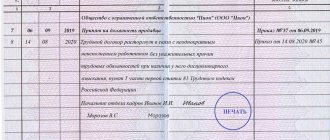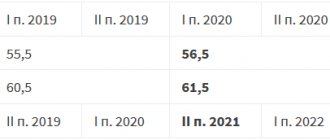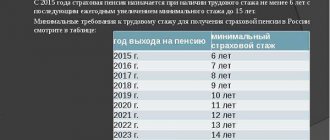Is it necessary to explain yourself in writing to your employer?
An explanatory note is necessary to show the connection between the violation committed by the employee and its causes.
There is no unified form of the document, but the manager has the right to approve it with the help of the organization’s regulations.
At the same time, the Labor Code of the Russian Federation does not indicate what reasons for violation of labor discipline can be considered valid. Therefore, the manager considers each case individually and makes decisions regarding the events at his own discretion.
The employer's request for an explanation from the employee must also be submitted in writing in two copies:
Articles on the topic (click to view)
- What to do and where to go if you are not paid upon dismissal
- What to do if you are laid off at work
- What to do if the employer does not want to fire at his own request
- What to do if the date of the dismissal order is later than the date of dismissal
- What to do if the employer does not give the work book after dismissal
- What to do if you didn’t work officially, you were fired, you didn’t get paid
- What is the employer obliged to give the employee on the day of dismissal?
- one for the guilty subordinate;
- the other is for the HR department.
The employee’s signature on the copy for HR officers confirms receipt of the request and familiarization with the document.
The explanatory note must be provided to the management of the organization within two working days. The employee may remain inactive during this period or give a written refusal to the employer.
In both cases, an act will be drawn up recording the employee’s disagreement with the explanatory note. This document will subsequently serve as the basis for ordering disciplinary action.
An explanatory note in electronic form without an employee’s personal signature is not a personnel document.
Practice
Do not forget that dismissal is a last resort, the most severe punishment provided for by labor legislation. This is why you cannot part with an employee simply because he was late for work for the second time in a year, even if the employer really wants it. The reasons for essentially expelling an employee from the team must be so convincing that the labor inspectorate and the court do not doubt their gravity and incompatibility with the continuation of work.
Rarely do any employees decide to find a practical answer to the question of how many reprimands can there be before dismissal? Usually, the parties prefer to reach an agreement and part ways quietly, with standard wording in the work book. But if the case does take a very unfavorable turn, then the employee can try to defend himself in court. The percentage of positive determinations in labor disputes should inspire optimism among workers.
It is clear that reinstatement at work by decision of the panel of judges will not improve relations with the authorities. But this needs to be done for several reasons:
- restoration of a good name and professional reputation, because the circumstances of dismissal are briefly stated in the labor report;
- a positive court decision will allow you to receive average earnings during the forced absence;
- an unfavorable outcome of an individual dispute disciplines the employer in further behavior with employees.
Additional advice for those employees who are faced with the arbitrariness of their superiors. There is no need to hide from the director's written demands. Refusal to receive them will not become an obstacle to further prosecution, and the employee will not have a document in his hands with which to go to the authorities. You must also remember that it is better to hand over your written explanations against the signature on the second copy. This alone can cool the ardor of an irrepressible leader. In addition, if you are faced with an obvious violation of your rights, you must definitely complain to the labor inspectorate.
In practice, it is quite difficult to bring about dismissal due to poor performance. Only if the specialist really ignores the requirements of discipline or work instructions. Moreover, you should not start this process if the desire to terminate the employment contract is dictated by personal hostility towards the employee.
Zinovieva Natalya Igorevna
Lawyer at the Legal Defense Board. Specializes in handling cases related to labor disputes. Defense in court, preparation of claims and other regulatory documents to regulatory authorities.
Still have questions on the topic Ask a lawyer
Can an employee be fired?
To find an answer to the question of whether they can be fired for explanatory reasons , you need to refer to Art. 81 of the Labor Code of the Russian Federation, which lists the grounds for termination of an employment contract.
Expert opinion
Polyakov Pyotr Borisovich
Lawyer with 6 years of experience. Specialization: civil law. More than 3 years of experience in drafting contracts.
It should be noted that refusal to write an explanatory note will not become an obstacle to disciplinary sanctions applied by the manager for violation of labor regulations:
The employer does not have the right to expand the above list enshrined in Art. 192 Labor Code of the Russian Federation.
Therefore, the introduction of a system of fines for employee misconduct is not legal. Employees affected by penalties can appeal the actions of the company management in court.
For gross violation
The application of types of penalties in turn is not mandatory. The law restricts the employer only in relation to dismissal as a measure of punishment for violation of labor discipline. As a rule, an employee can be fired no earlier than after the second offense.
There are a number of fairly serious violations that will be grounds for dismissal even if committed just once.
For a less serious offense
No one is immune from accidents. If a violation of labor regulations occurred for a reason that the employer considers valid, the subordinate will only receive a reprimand.
Dismissal without explanation
Dismissal of an employee is not a complicated procedure if you follow all the necessary nuances during registration. The grounds for legal termination of employment relations are listed in Art.
77, 80 and 81 of the Labor Code of the Russian Federation. But there is Article 278 of the Labor Code of the Russian Federation, which provides additional grounds for terminating employment relations with the head of an organization. The Labor Code clearly provides grounds for dismissal of employees.
Many employers tell their employees that if they have three explanations, this will automatically lead to termination of the employment relationship. Is it really?
How many explanations are required for dismissal?
Some employees are concerned about how much explanation is needed for dismissal because they are afraid of losing their place in the company.
It’s worth starting with the fact that an employee’s explanatory note is not a reason for dismissal. This document is needed so that the manager has a complete picture of the violation committed and makes an objective decision. Dismissal occurs only by order of the employer.
If an employee writes explanatory notes, it is obvious that he does not fulfill his job duties in full, as outlined in the job description. Repeated violation of the terms of the employment contract with the employer will lead to dismissal.
The organization’s personnel may consider management’s requirement to write an explanatory note regarding the violation of labor regulations as a manifestation of bureaucracy. But this document plays an important role in labor disputes and shows the validity of the employer’s actions in relation to the subordinate.
What is explanatory?
The Labor Code of the Russian Federation does not define this concept. But you can “decipher” it as follows: an explanatory note is a kind of note that the guilty employee writes to the employer, setting out in the document the reasons for what happened during the working day. Anything could happen:
- some kind of emergency;
- violation of labor discipline;
- non-compliance with labor protection, resulting in certain negative consequences;
- committing an administrative offense or even a crime.
Expert opinion
Polyakov Pyotr Borisovich
Lawyer with 6 years of experience. Specialization: civil law. More than 3 years of experience in drafting contracts.
An employee who is the culprit or witness to something like this, or who is the alleged culprit, gives an explanation of what happened. Should he do this?
When is it necessary to write an explanatory note, and is this the employee’s responsibility?
Art. 193 of the Labor Code of the Russian Federation states that the employer, if a violation of a disciplinary offense is detected, must require an explanatory statement from the employee. But the company employee himself has no obligation to make excuses. You can ignore this requirement. What to do?
There are several points of view on this matter:
- It's better not to write anything. As the saying goes: “Whatever you say can be used against you.”
- In any case, it is necessary to write an explanatory note. If you ignore the employer’s demand, he will consider the employee to be guilty.
We recommend sticking to the second point of view. If the boss requires you to write an explanatory note, then it is better to do so. In the document you need to outline your vision of the situation, give arguments in your favor, and report evidence that indicates the employee’s innocence.
Some, however, are afraid to write explanatory notes because they believe that they could be fired.
Video on the topic
How to act correctly if you are asked to write an explanatory note:
Next At the initiative of the employer Can you be fired from your job if you have a mortgage, loan, or debts Excellent article 0
Write in the explanatory note that at the moment, according to the Decree of the President of the Russian Federation of April 2, 2021 No. 239 “On measures to ensure the sanitary and epidemiological well-being of the population on the territory of the Russian Federation in connection with the spread of a new coronavirus infection (COM ID-19)” you are in self-isolation, the duty group in the kindergarten is not organized, they are not aware of the parent’s complaint, and also that the parent was not provided with any explanation.
Decree of the President of the Russian Federation of April 2, 2021 No. 239 “On measures to ensure the sanitary and epidemiological well-being of the population on the territory of the Russian Federation in connection with the spread of a new coronavirus infection (COM ID-19).”
In order to ensure the sanitary and epidemiological well-being of the population on the territory of the Russian Federation in connection with the spread of the new coronavirus infection (COM ID-19), in accordance with Article 80 of the Constitution of the Russian Federation, I decree:
1. Establish non-working days from April 4 to April 30, 2021 inclusive, with wages retained for employees.
2. Top officials (heads of the highest executive bodies of state power) of the constituent entities of the Russian Federation, taking into account the provisions of this Decree, based on the sanitary and epidemiological situation and the characteristics of the spread of the new coronavirus infection (COM ID-19) in the constituent entity of the Russian Federation, ensure the development and implementation of the complex restrictive and other measures, primarily:
a) determine, within the boundaries of the relevant constituent entity of the Russian Federation, the territories where it is planned to implement a set of restrictive and other measures aimed at ensuring the sanitary and epidemiological well-being of the population (hereinafter referred to as the relevant territory), including under the conditions of the introduction of a high alert regime, an emergency situation;
b) suspend (limit) the activities of individual organizations located in the relevant territory, regardless of their organizational and legal form and form of ownership, as well as individual entrepreneurs, taking into account the provisions of paragraphs 4 and 5 of this Decree;
c) establish a special procedure for the movement of persons and vehicles in the relevant territory, with the exception of vehicles engaged in interregional transportation.
3. Restrictive and other measures can be implemented at different periods of time within the general period established by paragraph 1 of this Decree.
4. This Decree does not apply to the following organizations (employers and their employees):
a) continuously operating organizations;
b) medical and pharmacy organizations;
c) organizations providing the population with food and essential goods;
d) organizations performing urgent work in an emergency situation and (or) when there is a threat of the spread of a disease that poses a danger to others, in other cases threatening the life, health or normal living conditions of the population;
e) organizations carrying out emergency repair and loading and unloading work;
f) organizations providing financial services in terms of urgent functions (primarily settlement and payment services);
g) other organizations determined by decisions of the highest executive body of state power of the constituent entity of the Russian Federation based on the sanitary and epidemiological situation and the characteristics of the spread of the new coronavirus infection (COM ID-19) in the constituent entity of the Russian Federation.
5. This Decree may apply to systemically important, as well as scientific and educational organizations in agreement with the Government of the Russian Federation.
6. Federal government bodies and management bodies of state extra-budgetary funds shall determine the number of federal civil servants and workers ensuring the functioning of these bodies from April 4 to April 30, 2021 inclusive.
7. State bodies of the constituent entities of the Russian Federation and local governments, based on the sanitary and epidemiological situation and the characteristics of the spread of the new coronavirus infection (COM ID-19) in the relevant territory of the Russian Federation, determine the number of state and municipal employees providing from April 4 to April 30, 2021. including the functioning of these organs.
8. Organizations engaged in the production and release of mass media, determine the number of employees ensuring the functioning of these organizations from April 4 to April 30, 2021 inclusive.
9. This Decree comes into force on the date of its official publication.
Can an employer expel an employee from the organization for providing explanations?
Let's turn to Art. 81 Labor Code of the Russian Federation. It talks about the grounds for dismissing an employee on the initiative of the head of the company. Among them there is no such thing as writing one or more explanatory notes.
This is because such notes themselves do not get you fired. An employer may initiate termination of an employment contract if an employee:
- grossly violated labor discipline once;
- committed several minor offenses;
- missed work (was not present at the organization for 4 hours);
- appeared in the organization in a state of intoxication, and so on.
In this case, the employer must conduct an investigation into the fact of the incident, draw up a report, prepare a dismissal order, if there are grounds, and also familiarize the employee with it.
How to act correctly if you are asked to write an explanatory note:
Dismissing an employee from their position is not as simple as it seems at first glance. This requires a good reason or a systematic violation of labor discipline. But even in these cases, the employee is given the right to protect his interests with the help of explanatory notes. How many of them are needed for dismissal and whether they affect this at all should be examined in more detail.
Explanatory letter
To clearly understand what an explanatory note is, you need to carefully understand some of the intricacies of administrative work. If an employee has committed violations related to the work process, the boss has the right to demand an explanation from him in writing.
In turn, the employee must describe in detail all the circumstances that led to the violation and submit the document for consideration by the manager. Based on the explanatory note, the boss draws up an appropriate act on bringing the employee to punishment. Depending on the offense, this could be:
- deprivation of bonus;
- rebuke;
- dismissal.
The Labor Code of the Russian Federation does not define this concept. But you can “decipher” it as follows: an explanatory note is a kind of note that the guilty employee writes to the employer, setting out in the document the reasons for what happened during the working day. Anything could happen:
- some kind of emergency;
- violation of labor discipline;
- non-compliance with labor protection, resulting in certain negative consequences;
- committing an administrative offense or even a crime.
An employee who is the perpetrator or witness of something like this, or who is the alleged perpetrator, gives an explanation of the fact of the incident. Should he do this?
Conditions and legal grounds for dismissal for absenteeism
- Free legal advice
- Your home lawyer
- How much absenteeism can one get fired from work?
- How to file a dismissal for absenteeism - a complete description of the procedure
- How to fire someone for absenteeism
- Absence from work
- After how many absences can you be fired?
- Dismissal for absenteeism
Free legal consultation An employment contract can be terminated by the employer, including in the event of a single gross violation of labor duties by the employee, including. Absenteeism means absence from the workplace without good reason during the entire working day (shift), regardless of its duration, as well as in the case of absence from the workplace without good reason for more than four hours in a row during the working day (shift) (paragraph .
After how many absences can you be fired?
Types of absenteeism Absenteeism without a good reason can be divided into three types - force majeure, personal circumstances and absenteeism due to an event known in advance (wedding, funeral). Let's take a closer look at each of them in this article.
- The employee was away from his/her workplace for 4 hours or more during the working day.
- The employee did not show up at his workplace for the entire working day, including less than four hours, if his shift lasted that long.
- The employee left work before the expiration of the fixed-term employment contract, or left work without warning the employer under an open-ended employment contract, or before the expiration of the notice of early termination of the contract (Articles 79, 80, 280, 292 of the Labor Code).
- The employee voluntarily took time off or went on vacation.
Can an employer expel an employee from the organization for giving explanations?
Let's turn to Art. 81 Labor Code of the Russian Federation. It talks about the grounds for dismissing an employee on the initiative of the head of the company. Among them there is no such thing as writing one or more explanatory notes.
This is because such notes themselves do not get you fired. An employer may initiate termination of an employment contract if an employee:
- grossly violated labor discipline once;
- committed several minor offenses;
- missed work (was not present at the organization for 4 hours);
- appeared in the organization in a state of intoxication, and so on.
In this case, the employer must conduct an investigation into the fact of the incident, draw up a report, prepare a dismissal order, if there are grounds, and also familiarize the employee with it.
This is important to know: Can a child be fired if a child is disabled?
If a serious offense has been committed
Violations such as absenteeism and appearing in a state of intoxication were mentioned above. These are serious offenses for which you will be fired immediately. The employer, when carrying out an “investigation,” requires an explanatory statement from the employee.
Thus, in this case, they can fire you with just one note.
If the violation is less serious
Repeated failure to fulfill official duties, if the employee already has a disciplinary sanction, is, in accordance with Art. 81 of the Labor Code of the Russian Federation, grounds for dismissal of an employee.
Art. 192 of the Labor Code of the Russian Federation indicates that the employer may apply the following penalties:
Thus, if in a particular case the employee’s guilt is established, and all the necessary documents are available about this, then it is indeed possible to fire him for three explanations.
It is possible to “fly out” of the organization for less explanatory reasons. After all, in Art. 81 of the Labor Code of the Russian Federation states that the following can be fired:
- for repeated failure to fulfill duties;
- if there is a penalty.
That is, in simple terms:
- A person must fail to perform duties at least twice.
- He must have a valid penalty. Which one is not important. The main thing is to know: according to Art. 194 of the Labor Code of the Russian Federation, the imposed penalty is valid for 1 year, unless the employer removes it earlier.
It turns out that it is possible to dismiss an employee, under the specified circumstances, even for a second explanatory note.
As a result, the employment contract is terminated without explanation. There can be, roughly speaking, 10 or 20 pieces, and if there are grounds provided for in Art. 81 Labor Code of the Russian Federation. If one of these grounds is missing, and the employer issues an order to dismiss the employee, then he has clearly violated the law.
How many reprimands does it take to get fired?
The legislation does not determine the number of penalties under consideration that give the right to dismiss an employee. That is, this can be done even if there is one such censure, but not based on its existence (you cannot fire for a reprimand), but the next time the employee violates discipline. It should be taken into account that in some cases repeated violations are required (clause 5, part 1, article 81 of the Labor Code).
Additionally
In most cases, they are kicked out after two reprimands, although this is at the discretion of the employer: he may not do this even if there are 3 or more reprimands of the type in question.
So, on this issue, the specifics are clear and comprehensive:
- This is the employer's right. The number of punishments before expelling an employee is not defined and is at the discretion of management;
- You can give several at once or sequentially, but only for different violations;
- is allowed for all types of non-compliance with discipline and rules that are charged to the employee: failure to fulfill duties, single or repeated violation.
Important
Let us separately point out an important point: you cannot impose another penalty for the same offense for which any punishment, including a reprimand, has already been applied. That is, it is impossible to fire someone for an offense for which there is already a punishment.
An analysis of judicial and legal practice reveals the conditions under which an employee can be dismissed:
- repeated violations . The employer has the right to apply dismissal if a new violation is discovered if the employee already has an outstanding penalty;
- one-time gross offense (clause 6 of article 81 of the Labor Code of the Russian Federation). If there are no outstanding penalties, then the employment contract can be terminated only under clause 6 of Art. 81 of the Labor Code of the Russian Federation, the list of such grounds is exhaustive and is interpreted unambiguously.
Dismissal at the request of management
All grounds for termination of cooperation can be classified as follows:
- Worker's initiative.
- Leadership initiative.
- Some circumstances are beyond the control of either party.
Not all employers know why they can fire an employee who disagrees. The procedure is feasible due to the presence of certain facts:
- The employee lacks the necessary skills and qualifications.
- Low performance, inconsistency with the position held (confirmed by certification).
- Violations by an employee of established discipline.
- Systematic failure to fulfill duties prescribed by management.
- Absence from work without prior approval from management (absenteeism) for 4 hours or more.
- The presence of a worker at the workplace under the influence of alcohol or drugs.
- Administratively proven theft, damage or embezzlement of someone else's property.
- Disclosure of official information or personal information of any colleague.
- Providing false documents during employment.
- If an employee who has access to material assets has committed any illegal act. Loss of trust in such an employee is also a sufficient basis for terminating the employment contract.
The following situations can be designated as force majeure circumstances:
- Forced need to reduce staff.
- Liquidation of an enterprise (closing an individual entrepreneur).
The listed grounds for dismissal are regulated by the Labor Code of the Russian Federation (Article 81). In addition to the above, there are some other facts that allow you to terminate an employment contract unilaterally. These include:
- Change of management or owner of the enterprise.
- Gross violation of the job description by management or his deputy.
- Making a wrong decision, which caused damage to the organization’s property or its unlawful use.
The presence of any of these facts (or all of them at once) allows you to dismiss the head of the enterprise (additional office, branch), his deputy or chief accountant without their consent.
Any employee in the civil service can also be removed from his post on the initiative of higher authorities. This occurs if the worker fails to comply with certain restrictions and prohibitions established by anti-corruption regulations, as well as if the assigned powers are exceeded.
Grounds for dismissal
The legal basis for dismissing an employee for systematically being drunk at work is the Labor Code of our country, namely its articles numbered 81, 76, 193 and 192.
Based on this code, you can fire a person who appears at work while intoxicated. Moreover, this condition means not only alcohol intoxication, but also stupefying the mind with narcotic or other toxic substances. Even if he was not at the workplace, but was at the facility or territory of the organization in such a state, he could be fired for drunkenness.
Important: dismissal of an employee is possible only if the state of intoxication is confirmed by a medical examination and considered by the court.
In addition to the MO, there must be other evidence. For example:
- an act recording the fact that an employee was intoxicated at work;
- an explanatory note written by the drunken employee himself;
- reports from other employees.
Expert opinion
Polyakov Pyotr Borisovich
Lawyer with 6 years of experience. Specialization: civil law. More than 3 years of experience in drafting contracts.
Russian legislation provides several grounds for dismissing an employee at the initiative of the employer. And one of them is the termination of a permanent employment contract or the dismissal of a person who was intoxicated at the workplace.
According to the current Labor Code (LC), bosses have the right to punish for drunkenness in the workplace. For this purpose, any disciplinary sanction may be applied:
- comment;
- rebuke;
- dismissal for drunkenness.
Calculation upon dismissal for absenteeism
The timing of payments upon dismissal is established by Articles 84.1 and 140 of the Labor Code, according to which payment of all amounts due to the employee is made on the day the employee is dismissed.
If any amounts are unpaid, the debt to the employee must be repaid immediately, taking into account interest calculated in accordance with Article 236 of the Labor Code. In addition, a delay in payments upon dismissal (incomplete payment of amounts due to the employee) in the event of a dispute in court can be interpreted by the employee in his favor as indirect evidence of the dismissal being completed “retrospectively”.
Can I be fired for giving three explanations for being late?
Hello, can I be fired for three explanations? At different periods, dismissal for being late
Good afternoon, Victoria.
They can, provided you already have a disciplinary sanction.
Labor Code of the Russian Federation Article 81. Termination of an employment contract at the initiative of the employer
An employment contract can be terminated by the employer in the following cases:
1) liquidation of an organization or termination of activities by an individual entrepreneur;
2) reduction in the number or staff of employees of an organization or individual entrepreneur;
3) the employee’s inconsistency with the position held or the work performed due to insufficient qualifications confirmed by certification results;
4) change of owner of the organization’s property (in relation to the head of the organization, his deputies and the chief accountant); 5) repeated failure by an employee to perform labor duties without good reason, if he has a disciplinary sanction;
?Which is accordingly documented
The employer has the right to apply disciplinary sanctions: 1) reprimand; 2) reprimand; 3) dismissal for appropriate reasons.
By refusing to provide an explanation for committing a disciplinary offense, the employee exercises his right to provide an explanation. According to Part 2 of Art. 193 of the Labor Code of the Russian Federation, if explanations are not provided, this does not prevent the application of disciplinary action.
Article 193. Procedure for applying disciplinary sanctions
Before applying disciplinary action, the employer must request a written explanation from the employee. If after two working days the employee does not provide the specified explanation, then a corresponding act is drawn up. (Part one as amended by Federal Law No. 90-FZ of June 30, 2006) Failure by an employee to provide an explanation is not an obstacle to applying a disciplinary sanction. (as amended by Federal Law No. 90-FZ of June 30, 2006) Disciplinary sanction is applied no later than one month from the date of discovery of the misconduct, not counting the time of illness of the employee, his stay on vacation, as well as the time required to take into account the opinion of the representative body of employees. A disciplinary sanction cannot be applied later than six months from the date of commission of the offense, and based on the results of an audit, inspection of financial and economic activities or an audit - later than two years from the date of its commission. The specified time limits do not include the time of criminal proceedings. For each disciplinary offense, only one disciplinary sanction can be applied. The employer's order (instruction) to apply a disciplinary sanction is announced to the employee against signature within three working days from the date of its publication, not counting the time the employee is absent from work. If the employee refuses to familiarize himself with the specified order (instruction) against signature, then a corresponding act is drawn up. (as amended by Federal Law No. 90-FZ of June 30, 2006) A disciplinary sanction can be appealed by an employee to the state labor inspectorate and (or) bodies for the consideration of individual labor disputes.
This is important to know: Who should not be laid off when downsizing in 2021
At different periods, dismissal for being late
Leave - makes one think of a military man.
1) If you are a civilian, then periods matter. If no action is taken for one late payment after a month, it means that you have no penalties.
Expert opinion
Polyakov Pyotr Borisovich
Lawyer with 6 years of experience. Specialization: civil law. More than 3 years of experience in drafting contracts.
That is, if more than a month has passed between the 1st and 2nd, 2nd and 3rd tardiness and you were not brought to disciplinary action, then you cannot be fired for the last tardiness (again, with the caveat - if this is not absenteeism ).
2) If you are a military personnel, then also, if there were no penalties for being late, then there are no grounds for dismissal. If there were penalties (including for the last one), then you can’t fire someone for that either. There should already be a certification commission working here to consider the issue of failure to fulfill the terms of the contract, and if it is determined that the serviceman does not fulfill the terms of the contract, then dismissal is possible.
Deadline for appealing dismissal
The period for appealing dismissal is one month from the date the employee was given a copy of the dismissal order or from the day the work book was issued, or from the day the employee refused to receive the dismissal order or work book (Article 392 of the Labor Code, paragraph 3 of the Resolution of the Plenum of the Supreme Court dated 17.03 .2004 No. 2 “On the application by the courts of the Russian Federation of the Labor Code of the Russian Federation”). Such a short statute of limitations for dismissal is dictated by the need to maintain a balance of interests between the employee and the employer.
As the long-term practice of our bureau employees, who have participated in hundreds of labor disputes “on both sides of the barricades”, shows, a correctly executed dismissal for absenteeism greatly facilitates the protection of the interests of Client-organizations in courts in cases of illegal dismissal and reinstatement, moving the dispute from the issue on the legality of the dismissal procedure in terms of proving the presence or absence of absenteeism on the part of the employee. In favor of the winning party, current legislation provides for the possibility of recovering legal costs incurred from a representative.
You can read more about judicial practice in labor disputes regarding dismissals for absenteeism in the article by R.N. Yuryev “Dismissal for absenteeism: problems of law enforcement practice”, published in the journal “Labor Disputes” for 2010, No. 5.
Dismissal due to a negative article: how and for what can you fire an employee?
The Labor Code contains information that the administration unilaterally has the right to dismiss an employee only in strictly specified cases.
All reasons for dismissing an employee under this article are described in the code. He needs to remember that if he is fired from his previous job due to an article, it may be difficult for him to get a new job.
Inconsistency with the position held (UZD)
The possibility of dismissing an employee due to inadequacy of the position is indicated in paragraph 3 of Art. 81 Labor Code of the Russian Federation. This reason is expressed in the fact that the level of his education or knowledge is lower than that required for the position held.
This reason is the most often disputed in the courts when dismissals under the article. Therefore, it is imperative to prepare all supporting documents.
The basis for dismissal under the article is the list of requirements contained in the job description. If an employee fails to cope with the duties assigned to him or produces defective products, it is necessary to certify him and determine the level of compliance with the requirements.
In addition to the certification of the administration, it is also advisable to obtain other confirmation that the employee is not competent.
If he refuses the offer, and there are no other positions, then the administration may dismiss him for lack of compliance.
Repeated failure to fulfill duties
This possibility of dismissal is established in paragraph 5 of Art. 81 Labor Code of the Russian Federation. The duties that an employee must perform are specified in his employment agreement, as well as in his job description.
If you plan to dismiss due to failure to perform duties, you must first make sure that these documents have been delivered to the employee against signature.
Also, each case where non-compliance was established must be recorded in an act and an explanatory note must be taken from the employee.
In addition, failure to comply is a disciplinary violation. This means that before dismissal, the employee must first be given a warning and reprimand. Dismissal can only be done when a more lenient punishment does not bring results.
Constant tardiness and absenteeism
Being late or absenteeism is one of the types of failure to fulfill duties. Lateness is absence from work for less than 4 hours. Absenteeism - when the period of absence exceeds 4 hours, or the employee does not show up at work at all.
For being late, you must first issue a warning, then issue a reprimand. And only after this the employee can be fired. For failure to show up, it is allowed to immediately apply the maximum penalty - dismissal.
In these situations, it is also necessary to record each violation in writing. After this, the employee must be required to provide an explanatory note.
Also, an employee may be absent from his place for valid reasons. If he can provide evidence, then dismissal under the article cannot be carried out.
Embezzlement and theft
Theft is the theft of property of an organization, its employees or third parties. Embezzlement is considered a special case of theft.
Expert opinion
Polyakov Pyotr Borisovich
Lawyer with 6 years of experience. Specialization: civil law. More than 3 years of experience in drafting contracts.
In each of these cases, it is necessary to prove that there was intent on the part of the employee. Also, the crime must occur on the territory of the organization.
The possibility of dismissal for this reason is established in paragraph 6 of Art. 81 Labor Code of the Russian Federation.
The administration may impose a reprimand or warning as punishment. However, once this is done, it will no longer be possible to fire the employee, since it is prohibited to punish for the same violation twice.
Dismissal due to loss of confidence
This type of dismissal can only apply to financially responsible persons who deal with money or material assets. This possibility is specified in paragraph 7 of Art. 81 Labor Code of the Russian Federation.
Dismissal can be made if the employee has committed any act, and now his presence will threaten the integrity of the organization’s property.
The law does not stipulate what specific actions can lead to mistrust. In practice, this happens when an employee commits theft, loss of property, theft, or takes a bribe. For dismissal, it does not matter where exactly the violation was recorded, the main thing is that it happened.
Showing up to work drunk
If an employee appears at work in a state of intoxication, or uses alcohol or drugs at his workplace, then he can be fired for drunkenness, as provided for in clause 6. Art. 81 Labor Code of the Russian Federation.
It must be remembered that being intoxicated at work can threaten the life and health of not only oneself, but also other employees.
It is very important that being in a state of intoxication is documented by a medical report. However, you cannot force an employee to go through it.
Expert opinion
Polyakov Pyotr Borisovich
Lawyer with 6 years of experience. Specialization: civil law. More than 3 years of experience in drafting contracts.
Also, drunkenness in the workplace can be recorded in other ways - an act of violation, an employee’s explanatory note, an order of removal due to intoxication, etc. Management independently makes the decision on dismissal.
Disclosure of commercial or state secrets
Dismissal for this reason is possible if the employee performed or failed to perform a certain action, and commercial or state secrets became available to third parties. Disclosure may take various forms—oral, written, etc.
This is important to know: How to quit through court
It is recommended that organizations develop a separate trade secret provision that will precisely define what exactly a trade secret is.
Dismissal for this reason is defined in paragraph 6 of Art. 81 Labor Code of the Russian Federation. It is very important that this information becomes known to the employee in the process of performing his duties.
Negative consequences
It is important for the employer to comply with all provisions of labor legislation, especially when dismissing at the initiative of the enterprise. It is necessary that the actions of the organization's management be justified and documented.
When a disciplinary sanction in the form of a reprimand is applied to an employee, it is necessary to ensure that there has been a real violation of the rules established by the enterprise by local regulations, which the employee has personally read and signed.
You need to understand that if an employee goes to court, the organization will be asked for documents about the employee’s labor duties and the grounds for his dismissal. For this reason, it is necessary to record in detail all the circumstances of the violation.
In addition, the employer must request an explanatory note from the employee. Even if he refused to write it, the dismissal materials should include a request for this document.
In general, in personnel work it is important to clearly, timely and accurately prepare all the necessary documents. The job description, employment contract and local regulations must be drawn up in accordance with the requirements of labor legislation. The employee must be familiarized with them against his signature.
If any of the conditions are violated, then the court may declare the dismissal illegal, and this threatens the company with reinstatement of the employee in the workplace, as well as material costs. You will have to pay wages for the period of forced absence, as well as cover moral damages.
An employee who believes that he was fired illegally has the right to appeal to the labor dispute commission or the labor inspectorate. The latter is not necessary; you can immediately send the application to the court.
If an employee is negligent in his duties and does not comply with the work schedule at the enterprise, disciplinary action in the form of a reprimand can be applied to him. It is valid for one year and at the end of this period is considered repaid. However, if within the specified period the employee commits a new offense, management has the right to dismiss him.
In this case, the contract is terminated on the basis of Art. 81 (clause 5) of the Labor Code of the Russian Federation. It is important for the employer to comply with all legal requirements and correctly document the fact of misconduct and the dismissal itself. Otherwise, the employee has the right to go to court to declare the termination of the contract illegal.
For how many explanations can one be fired?
They can be fired for: Additional information To submit an order to apply a disciplinary sanction, the manager must be competently executed by preparing a documentary base, such as: 1 sources recording the misconduct, a memorandum, an act of the commission; 2 notification to the employee of the need to write an explanatory note; 3 in the absence of an explanatory note - an act about it; 4 in case of refusal to sign an order of reprimand by an employee - also a corresponding act.
For making an unreasonable decision by department heads that caused damage, or for violating their official duties. The application of disciplinary sanctions not provided for by federal laws, charters and regulations on discipline is not permitted. When imposing a disciplinary sanction, the severity of the offense committed and the circumstances under which it was committed must be taken into account.
Labor Code of the Russian Federation, Article Procedure for applying disciplinary sanctions Before applying a disciplinary sanction, the employer must request a written explanation from the employee. If after two working days the employee does not provide the specified explanation, then a corresponding act is drawn up. Failure by an employee to provide an explanation is not an obstacle to applying disciplinary action.
Disciplinary action is applied no later than one month from the date of discovery of the misconduct, not counting the time of illness of the employee, his stay on vacation, as well as the time necessary to take into account the opinion of the representative body of employees. Violation of a legally unsecured duty does not count. Added a little later: according to the 1st explanatory note, there was a reprimand. If you have one reprimand, then regardless of the legality of the grounds for issuing it, you may be fired, alternatively to your application for life insurance, due to repeated failure to fulfill job duties.
The situation is as follows: I was 5 minutes late for work in November, they told me to write an explanatory note, I wrote it, they gave me a reprimand, putting it in my personal file and depriving me of my bonus. The third time I was late by 1.5 hours. I haven’t written an explanatory note yet, can I be fired for the third explanatory note? Based on the explanatory notes, the employer can impose a disciplinary sanction on you, in accordance with the article of the Labor Code of the Russian Federation: For committing a disciplinary offense, that is, failure or improper performance by an employee through his fault of the work duties assigned to him, the employer has the right to apply the following disciplinary sanctions: 1 remark; 2 reprimand; 3 dismissal for appropriate reasons.
It all depends on how the employer acted and in what order he imposed disciplinary sanctions. The plaintiff filed a claim to cancel the decisions of the courts of the first and second instances, declaring her dismissal illegal under sub. The courts of the first and second instances did not find grounds to satisfy the plaintiff’s demands, considering that the latter abused her right. At the same time, the judges referred to the fact that the applicant informed the director of the organization about the fact of pregnancy only orally, after which she was temporarily disabled and did not provide the employer with a certificate of her pregnancy, sending certificates of incapacity for work by mail.
Is it possible to fire a pregnant woman for absenteeism and what can be considered absenteeism? What is absenteeism and is a pregnant woman’s absence from work always considered absenteeism? Is it possible to punish a pregnant woman for absenteeism without firing her? How to record absenteeism for the purpose of imposing a disciplinary sanction. Can an employee be fired for absence from work without a valid reason after the end of her pregnancy?
Can a pregnant woman be fired for absenteeism - what does judicial practice say? And I personally very much doubt that a demand like yours will be recognized as a failure to fulfill official duties. Alexandra, hello! No, there was no order. ElektrostalChat 8.1 rating Article Procedure for applying disciplinary sanctions Before applying a disciplinary sanction, the employer must request a written explanation from the employee.
The procedure for applying disciplinary sanctions. Guides to personnel issues and labor disputes. Questions of application of Art. Federal Law No. The specified time limits do not include the time of criminal proceedings. If the employee refuses to familiarize himself with the specified order against signature, then a corresponding act is drawn up. Contents: In what cases is dismissal possible for a reprimand under the Labor Code of the Russian Federation and how, in this case, an entry is made into the employment record Dismissal under the article and the requirement of three explanatory notes at a time How many explanatory notes before dismissal 3 explanatory notes and dismissal Is dismissal possible for explanatory notes?
Can a pregnant woman be fired for giving explanations? Can she be fired for 2 explanations? Is it possible to be fired after three explanations? Popular: When payments are made when staffing is reduced How to obtain citizenship in a simplified manner Agreement on joint activities between a LLC and an individual Department in the staffing table Bailiffs withheld money for a traffic fine when they see him in the traffic police Benefits of a single mother Murmansk Cancellation of a disciplinary sanction at the initiative of the employer The employee does not signed an employment contract but works.
Dismissal under article and requirement of three explanatory notes at a time
The application of disciplinary sanctions not provided for by federal laws, charters and regulations on discipline is not permitted.
When imposing a disciplinary sanction, the severity of the offense committed and the circumstances under which it was committed must be taken into account. Labor Code of the Russian Federation, Article 193. Procedure for applying disciplinary sanctions Before applying a disciplinary sanction, the employer must request a written explanation from the employee. If after two working days the employee does not provide the specified explanation, then a corresponding act is drawn up.
Failure by the employee to provide an explanation is not an obstacle to the application of a disciplinary sanction. A disciplinary sanction is applied no later than one month from the date of discovery of the misconduct, not counting the time the employee is ill, on vacation, as well as the time required to take into account the opinion of the representative body of employees.
How many absences can someone be fired for?
But it must be remembered that in this case, dismissal is an extreme measure of employee liability for such a violation of labor discipline. Before this, penalties such as a reprimand and a reprimand should be applied to him, as a violator of labor discipline. However, absence from work that lasts more than four hours in a row without a valid reason may be grounds for immediate dismissal of an employee for absenteeism. Violation by an employee of internal labor regulations, late appearance at work, ignoring and failure to perform his job functions is not a direct basis for dismissal in connection with their one-time occurrence in this employee.
Termination of an employment contract according to law
Absenteeism is considered to be the absence of an employee from the workplace without good reason during the entire working day (shift), regardless of its duration, as well as absence from the workplace without good reason for more than four hours in a row during the working day (shift).
Go to his house. You can talk to your neighbors, etc. After all, you don’t pay him a salary anyway, so why rush in order to possibly end up in a lawsuit? Password is someone else's computer Forgot your password? © 1997 - 2021 PPT.
This is one of the three measures of employee liability for neglect of labor duties provided for by law. We will look at dismissal due to a reprimand: all the nuances, circumstances and ways to avoid it. An elegant circumvention of labor law requirements. I will also tell you what an employer should do to avoid such tricks of an employee when dismissing him for absenteeism. Let's say that today you, the blog reader, were away from work for more than four hours.
How late can you be fired?
Evgeniy Sazhin The situation is as follows: I was 5 minutes late for work in November, they told me to write an explanatory note, I wrote it, they reprimanded me, put it in my personal file and lost my bonus. The third time I was late by 1.5 hours. I haven’t written an explanatory note yet, can I be fired for the third explanatory note? How many explanatory notes are needed for dismissal 1. It is necessary to check whether there is a document according to which the employee is obliged to fulfill the job duty that he violated and did not fulfill. An employee can be held accountable for committing a violation of failure to fulfill some job duty established by a clause in the job description, internal labor regulations, employment contract, etc. Violation of a legally unsecured duty does not count. In writing against signature or by registered telegram.









